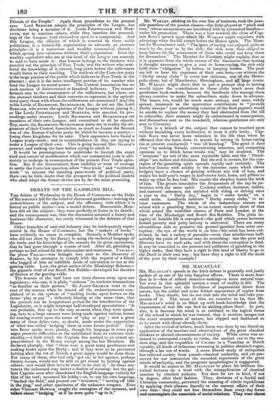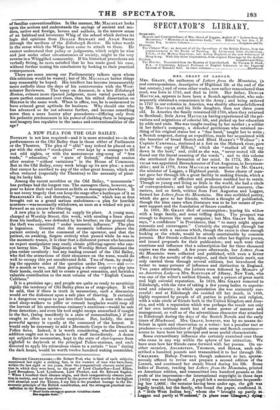MR. MACAULAY.
MR. MACAULAY'S speech in the Irish debate is generally and justly spoken of as one of his very happiest efforts. There is more free- dom in it—less of stilted sentence-making—a more natural tone. Yet even in this splendid oration a want of reality is felt. The illustrations have not the liveliness of impressions direct from nature, but the colder and more formal appearance of copies from books. They dazzle, but do not sink into the mind and take pos- session of it. The cause of this, we conceive to be, that Mr. MACAULAY'S mind is so filled up with book-knowledge that the impressions of real life can find no abiding-place there. In part, also, it is because his mind is so subdued to the logical forms of the school in which he was trained, that it receives images not the exact counterparts of nature, but clipped and fashioned so as to assort with those already there. After the revival of letters, much harm was done by too literal an application of the maxims and observations of the great classical thinkers to altered circumstances of society. While virtue was as- sumed to correspond exactly to virtue, the ancient rex to the mo- dern king, and the respublica of Ciento to a Venetian or Dutch republic, all kinds of fallacious reasoning in politics obtained vogue, through a lax use of words. A more liberal study of antiquities has relieved society from pseudo-classical authority, and yet pre- served for our instruction the recorded experience of the great minds of antiquity, and the pregnant apophthegms it sugggested.
It would be unjust to Mr. MACAULAY to place his brilliant his- torical lectures on a level with the misapplication of classical maxims by obsolete pedants. Yet does he err in kind, if not- in degree, after their fashion. They, denizens of a feudal and Christian community, perverted the meaning of ethnic republicans by applying their phrases literally to the current affairs of their own time : they could not free themselves from every-day forma and contemplate the essentials of social relations. They were slant of familiar conventionalities. In like manner, Mr. MACAULAY looks upon the actions and understands the sayings of ancient and mo- dern, native and foreign, heroes and authors, in the narrow sense of an habitual and inveterate Whig of the school which derives its logic ad opinions from DUGALD STEWART and Aiwa SMITH through the medium of the Edinburgh Review. He takes words in the sense which the Whigs have come to attach to them. He cannot understand that policy or judgments, which might be wise and just under other circumstances of society, might be the very reverse in a Whiggified community. If his historical precedents are verbally fitting, he rests satisfied that he has made good his case, without further testing his conclusions by looking to their practical consequences. There are some among our Parliamentary talkers upon whom this criticism would be wasted ; but of Mr. MACAULAY better things may reasonably be hoped. His intellect has become immeasurably more catholic since the days of his controversies with the West- minster Reviewers. The essay on ADDISON, in a late Edinburgh Review, evinces more ripened judgment, more varied powers, and more perfect command over them, than his stilted dissertation on MILTON in the same work. When in office, too, he is understood to have evinced great aptitude for business. Why should obe who has advanced so far not advance further, and become something more than a mere hunter after precedents—differing only from his pedantic predecessors in his power of clothing them in language and imagery less repulsive to the tastes and conventionalities of the age?



























 Previous page
Previous page